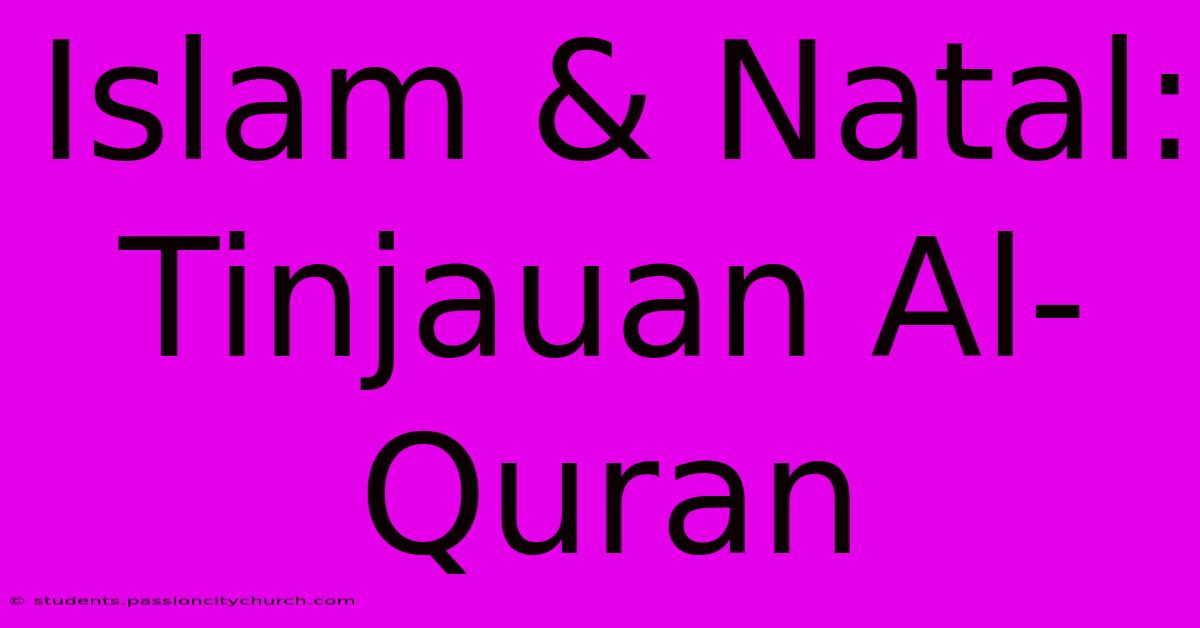Islam & Natal: Tinjauan Al-Quran

Discover more detailed and exciting information on our website. Click the link below to start your adventure: Visit Best Website. Don't miss out!
Table of Contents
Islam & Natal: A Quranic Perspective (Tinjauan Al-Quran)
The celebration of Christmas, or Natal, holds significant cultural and religious importance for billions worldwide. However, for Muslims, understanding its place within an Islamic framework requires careful consideration of Quranic teachings and Islamic jurisprudence. This article provides a nuanced exploration of Islam's perspective on Natal, drawing directly from the Quran and avoiding direct engagement with specific cultural practices associated with the holiday. We will focus on the core theological principles relevant to a Muslim's understanding of this Christian celebration.
Understanding the Quranic Context:
The Quran, the central religious text of Islam, does not directly mention Christmas or the birth of Jesus. This absence, however, does not imply indifference. Islam holds Jesus (Isa Al-Masih) in high regard, recognizing him as a prophet of God, a significant figure sent to guide humanity. The Quran acknowledges his miraculous birth to Mary (Maryam), a virtuous woman chosen by God.
Key Quranic Verses Regarding Jesus:
Several verses in the Quran discuss the birth and life of Jesus, highlighting his divine status and prophethood. These verses offer crucial insights for understanding the Islamic perspective on Natal:
-
The Virgin Birth: The Quran unequivocally affirms the virgin birth of Jesus. Surah Maryam (Chapter 19) details the miraculous conception of Jesus, emphasizing God's power and Mary's piety. This miracle reinforces the divine nature of Jesus's mission. However, the Quran emphatically rejects the concept of the Trinity, a central tenet of Christian theology.
-
Jesus as a Prophet: The Quran clearly identifies Jesus as a prophet of God, sent with a divine message to his people. He is mentioned alongside other prophets like Moses (Musa) and Abraham (Ibrahim), emphasizing the unity of God's message throughout history. This recognition of Jesus's prophethood underscores the respect Islam accords him.
-
Rejection of Divinity: The Quran vehemently refutes the Christian doctrine of the divinity of Jesus. It emphasizes the absolute oneness of God (Allah) and rejects any notion of a trinity or a divine partnership. This core Islamic belief is foundational to understanding the Muslim perspective on Christmas celebrations which center on the divinity of Jesus.
Islamic Perspective on Celebrating Natal:
Given the Quran's emphasis on the oneness of God and the rejection of the Trinity, celebrating Christmas in the same manner as Christians would be considered incompatible with Islamic principles. The focus on the divinity of Jesus, a central element of Christmas celebrations, directly contradicts core Islamic beliefs.
However, this does not imply a blanket condemnation of all aspects related to the birth of Jesus. Muslims are encouraged to respect the beliefs of others and to engage in peaceful coexistence. Acknowledging the historical significance of Jesus's birth and his role as a prophet is consistent with Islamic teachings.
Focusing on the Shared Values:
Despite theological differences, Islam and Christianity share many common values, including:
- Monotheism: Both religions fundamentally believe in one God, albeit with different understandings of God's nature and attributes.
- Prophethood: Both recognize the importance of prophets as messengers of God, albeit with different lists of prophets.
- Moral Principles: Both religions emphasize moral principles such as compassion, justice, and charity.
Recognizing and emphasizing these shared values can foster better understanding and peaceful interfaith relations.
Respect and Tolerance in Interfaith Dialogue:
The Islamic approach to Natal should be one of respect and tolerance. While Muslims do not participate in Christmas celebrations in the same way as Christians, respecting the religious beliefs and practices of others is a cornerstone of Islamic teachings. This involves understanding the significance of the holiday for Christians without compromising one's own faith.
Avoiding Misunderstandings:
It's crucial to avoid misunderstandings. The Islamic perspective on Natal is not about rejecting or denigrating the Christian faith. It is about maintaining the theological integrity of Islam while fostering peaceful coexistence with followers of other faiths.
Conclusion:
The Quran provides a framework for understanding Islam's perspective on Natal. While the Quran does not explicitly mention the holiday, it provides detailed accounts of Jesus's birth and his prophethood. However, the core theological differences regarding the divinity of Jesus necessitate a distinct Islamic approach to the celebration. Focusing on shared values, promoting respect, and fostering peaceful dialogue are essential components of a constructive understanding of the relationship between Islam and Natal. The focus should remain on the affirmation of the prophethood of Jesus within the context of the absolute oneness of God, a central tenet of Islamic faith. This approach allows for respectful coexistence and interfaith understanding without compromising core religious beliefs. Ultimately, understanding the Quranic perspective allows for a more informed and nuanced discussion about the relationship between Islam and Christmas.

Thank you for visiting our website wich cover about Islam & Natal: Tinjauan Al-Quran. We hope the information provided has been useful to you. Feel free to contact us if you have any questions or need further assistance. See you next time and dont miss to bookmark.
Also read the following articles
| Article Title | Date |
|---|---|
| Confirmed Cast Vengeance Most Fowl | Dec 26, 2024 |
| Edwards Leads Timberwolves Past Mavs | Dec 26, 2024 |
| Christmas Day Weather In Timmins | Dec 26, 2024 |
| Acidente Aereo Embraer 67 Mortos No Cazaquistao | Dec 26, 2024 |
| Chiefs Secure No 1 Seed Steelers Game Highlights | Dec 26, 2024 |
| Prediksi Bahrain Vs Irak Piala Teluk 2024 | Dec 26, 2024 |
| Was Kelces Dunk Penalty Intentional | Dec 26, 2024 |
| Auto Da Compadecida 2 Pontos Fortes E Fracos | Dec 26, 2024 |
| Pohon Natal Unik Dari Botol Bekas Air | Dec 26, 2024 |
| Best Boxing Day Deals Shopping Now | Dec 26, 2024 |
